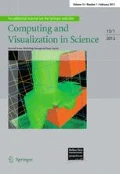Abstract
We present a technique for proving convergence of h and hp adaptive finite element methods through comparison with certain reference refinement schemes based on interpolation error. We then construct a testing environment where properties of different adaptive approaches can be evaluated and improved.



Similar content being viewed by others
Notes
Finding the maximum will introduce a logarithm into the complexity (e.g., we keep all the elements in a heap based on their errors), but this is not important in this context.
References
Babuška, I., Vogelius, M.: Feedback and adaptive finite element solution of one-dimensional boundary value problems. Numer. Math. 44(1), 75–102 (1984). https://doi.org/10.1007/BF01389757
Bank, R.E.: PLTMG: A Software Package for Solving Elliptic Partial Differential Equations, Users’ Guide 12.0. Technical report, Department of Mathematics, University of California at San Diego (2016)
Bank, R.E., Deotte, C.: Adventures in adaptivity. Comput. Vis. Sci. 18(2–3), 79–91 (2017). https://doi.org/10.1007/s00791-016-0272-4
Bank, R.E., Nguyen, H.: \(hp\) adaptive finite elements based on derivative recovery and superconvergence. Comput. Vis. Sci. 14(6), 287–299 (2011). https://doi.org/10.1007/s00791-012-0179-7
Bank, R.E., Sherman, A.H., Weiser, A.: Refinement algorithms and data structures for regular local mesh refinement. In: Scientific computing (Montreal, Que., 1982), IMACS Trans. Sci. Comput., I, pp. 3–17. IMACS, New Brunswick, NJ (1983)
Bank, R.E., Xu, J., Zheng, B.: Superconvergent derivative recovery for Lagrange triangular elements of degree \(p\) on unstructured grids. SIAM J. Numer. Anal. 45(5), 2032–2046 (2007). https://doi.org/10.1137/060675174
Bank, R.E., Yserentant, H.: A note on interpolation, best approximation, and the saturation property. Numer. Math. 131(1), 199–203 (2015). https://doi.org/10.1007/s00211-014-0687-0
Bürg, M., Dörfler, W.: Convergence of an adaptive \(hp\) finite element strategy in higher space-dimensions. Appl. Numer. Math. 61(11), 1132–1146 (2011). https://doi.org/10.1016/j.apnum.2011.07.008
Carstensen, C., Gallistl, D., Gedicke, J.: Justification of the saturation assumption. Numer. Math. 134(1), 1–25 (2016). https://doi.org/10.1007/s00211-015-0769-7
Demlow, A., Stevenson, R.: Convergence and quasi-optimality of an adaptive finite element method for controlling \(L_2\) errors. Numer. Math. 117(2), 185–218 (2011). https://doi.org/10.1007/s00211-010-0349-9
Dörfler, W.: A convergent adaptive algorithm for Poisson’s equation. SIAM J. Numer. Anal. 33(3), 1106–1124 (1996). https://doi.org/10.1137/0733054
Dörfler, W., Nochetto, R.H.: Small data oscillation implies the saturation assumption. Numer. Math. 91(1), 1–12 (2002). https://doi.org/10.1007/s002110100321
Guo, B., Babuška, I.: The \(hp\) version of the finite element method. Part 1: the basic approximation results. Comput. Mech. 1(1), 21–41 (1986)
Holst, M., Pollock, S.: Convergence of goal-oriented adaptive finite element methods for nonsymmetric problems. Numer. Methods Partial Differ. Equ. 32(2), 479–509 (2016). https://doi.org/10.1002/num.22002
Holst, M., Pollock, S., Zhu, Y.: Convergence of goal-oriented adaptive finite element methods for semilinear problems. Comput. Vis. Sci. 17(1), 43–63 (2015). https://doi.org/10.1007/s00791-015-0243-1
Mitchell, W.F.: A collection of 2D elliptic problems for testing adaptive grid refinement algorithms. Appl. Math. Comput. 220, 350–364 (2013). https://doi.org/10.1016/j.amc.2013.05.068
Mitchell, W.F.: How high a degree is high enough for high order finite elements? Proc. Comput. Sci. 51, 246–255 (2015)
Mitchell, W.F., McClain, M.A.: A survey of \(hp\)-adaptive strategies for elliptic partial differential equations. In: Recent Advances in Computational and Applied Mathematics. Springer, Dordrecht, pp. 227–258 (2011). https://doi.org/10.1007/978-90-481-9981-5_10
Mitchell, W.F., McClain, M.A.: A comparison of \(hp\)-adaptive strategies for elliptic partial differential equations. ACM Trans. Math. Softw. 41(1), Art. 2, 39 (2014). https://doi.org/10.1145/2629459
Nochetto, R.H., Siebert, K.G., Veeser, A.: Theory of adaptive finite element methods: an introduction. In: Multiscale, nonlinear and adaptive approximation. Springer, Berlin, pp. 409–542 (2009). https://doi.org/10.1007/978-3-642-03413-8_12
Nochetto, R.H., Veeser, A.: Primer of adaptive finite element methods. In: Multiscale and Adaptivity: Modeling, Numerics and Applications. Lecture Notes in Mathematics, vol. 2040. Springer, Heidelberg, pp. 125–225 (2012). https://doi.org/10.1007/978-3-642-24079-9
Stevenson, R.: Optimality of a standard adaptive finite element method. Found. Comput. Math. 7(2), 245–269 (2007). https://doi.org/10.1007/s10208-005-0183-0
Verfürth, R.: A Posteriori Error Estimation Techniques for Finite Element Methods. Numerical Mathematics and Scientific Computation. Oxford University Press, Oxford (2013). https://doi.org/10.1093/acprof:oso/9780199679423.001.0001
Author information
Authors and Affiliations
Corresponding author
Additional information
Communicated by Volker Schulz.
Publisher's Note
Springer Nature remains neutral with regard to jurisdictional claims in published maps and institutional affiliations.
Randolph E. Bank: The work of this author was supported by the National Science Foundation under Contract DMS-1318480, and the Alexander von Humboldt Foundation through a Humboldt Research Award.
Rights and permissions
About this article
Cite this article
Bank, R.E., Yserentant, H. On the convergence of adaptive feedback loops. Comput. Visual Sci. 20, 59–70 (2019). https://doi.org/10.1007/s00791-019-00310-4
Received:
Accepted:
Published:
Issue Date:
DOI: https://doi.org/10.1007/s00791-019-00310-4




